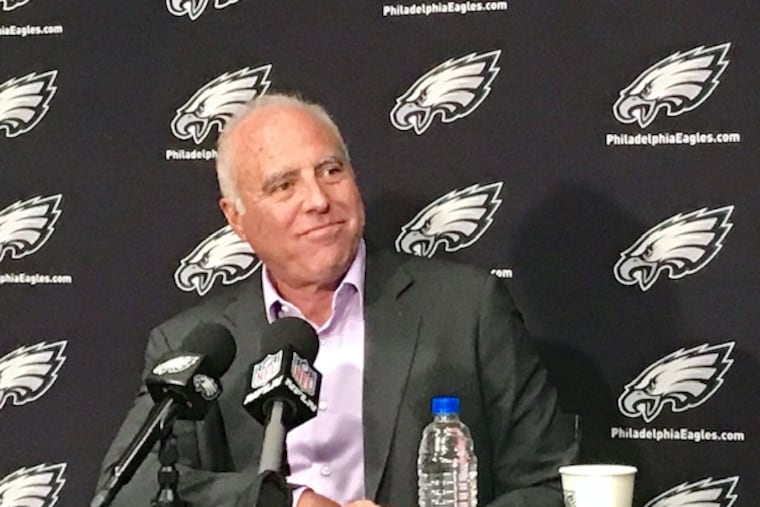NFL makes pass interference reviewable, with Eagles’ owner Jeffrey Lurie helping lead the charge
Lurie says the NFL can't ask fans to invest their passion without doing everything it can to get the result right.

PHOENIX — The NFL decided Tuesday to make pass interference reviewable, whether a flag is thrown on the play or not, and no one seemed happier about this than Eagles owner Jeffrey Lurie.
New Orleans coach Sean Payton, whose team was denied a Super Bowl berth this year on a pass interference non-call, Lurie and Dallas coach Jason Garrett were credited as influencing a leaguewide swing from the competition committee’s original idea — reviewing PI only after a penalty has been whistled. It was a dramatic end to a day of debate NFL vice president of football operations Troy Vincent called “messy at times … it was disruptive.”
“What I said was that I think integrity is the most important thing we’re dealing with in the National Football League,” Lurie said. “That and safety are the two most important things. … I always feel the NFL should be branded as an arbiter of truth. People rely on us for accuracy. It’s never going to be 100 percent. It’s impossible; we’re human. But we have the capability [to do better].”
Lurie said he stressed to the owners’ gathering that they shouldn’t leave until they solved the expanded replay issue. Garrett reportedly also spoke of integrity, and of game-changing plays, such as the Dez Bryant non-catch in the 2014 playoffs.
“I was worried about it,” when the day began, Lurie said. “I said to somebody, ‘I don’t care if we have to stay ‘til midnight, I want to get this done.’
“You’re asking people to devote their heart and soul — you’re asking your players, your coaches and your fans to devote … our heart and soul to it. It’s not just [like] you’re manufacturing shoes. If you’re asking people to deliver their emotions to the product you’re presenting, then you owe it to everybody you’re presenting it to, to be as accurate as humanly possible.”
Competition committee chairman Rich McKay talked last week about how hard it is to get the required 24 votes for replay changes, and particularly for adding fouls to the game. As dusk fell on the Arizona Biltmore Tuesday, McKay marveled that “we were able to make sausage in one day.”
The NFL also made all blindside blocks illegal and made permanent the changes in kickoff rules that were enacted on a one-year trial last year. A Kansas City proposal to ensure both teams get the ball in overtime was tabled until May, and a Denver proposal to give a team a fourth-and-15 shot at keeping the ball in lieu of an onside kick was defeated.
The vote on expanding replay on a one-year trial was 31-1, commissioner Roger Goodell said. It was very clear the Eagles weren’t ever going to be the “one.” Lurie told reporters he has “supported every proposal to expand replay over the last decade.”
The original competition committee replay proposal was called Rule 6a. The coaches apparently were strongly in favor of 6b, which would have added an “eye in the sky” official who would buzz down to review incorrect calls. The agreed-upon compromise, called 6c, works within the established replay system. Until the final two minutes, a coach must use one of his two challenges to ask for a review of perceived offensive or defensive pass interference. The replay official then confers with officiating head Al Riveron in New York. Inside two minutes, the replay judge initiates a review.
The Eagles were responsible for one subset of the new rule, having to do with penalties that nullify scoring plays. Lurie said that now something like the Dallas Goedert touchdown against Dallas that was called back for offensive pass interference will be reviewed.
Earlier Tuesday, Eagles coach Doug Pederson enthusiastically endorsed expanding replay.
“My position is I want to get it right. I want to get the calls right,” Pederson said. “Listen, I can appreciate these officials. It’s a tough game to officiate right now. The speed of the game … it’s tough on these guys … my position is I want to get the calls right and make the game, especially for the fans, an exciting game, where a lot of calls aren’t being missed, or if they are missed, we can make them right.”
Both Goodell and Lurie said they see this move as part of a trend toward opening up more and more plays to replay review. McKay, who is proud of the fact that game length has gone down by four minutes since 2015, might have his work cut out for him if that is the case.
“I don’t think we should be scared of where replay can expand,” Goodell said.